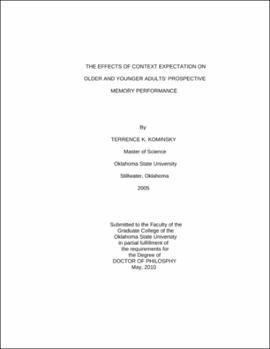| dc.contributor.advisor | Reese-Melancon, Celinda | |
| dc.contributor.author | Kominsky, Terrence K. | |
| dc.date.accessioned | 2013-11-26T08:27:41Z | |
| dc.date.available | 2013-11-26T08:27:41Z | |
| dc.date.issued | 2010-05 | |
| dc.identifier.uri | https://hdl.handle.net/11244/6956 | |
| dc.description.abstract | Scope and Method of Study: The purpose of this study was to examine the impact of context expectation on cost to the ongoing task and the prospective memory (PM) performance of older and younger adults. Participants were randomly assigned to one of the following context expectation conditions: correct, incorrect, and none. Participants performed a lexical decision task (LDT) that was divided in two blocks of 100 trails. The PM task was embedded in the LDT task. Participants in the correct context expectation condition were presented with the PM targets in the LDT block they were told they could expect them. Participants in the incorrect context expectation condition were presented with the PM targets in the opposite LDT block they were told they could expect them. Participants in the no context expectation conditions were presented with the PM targets in one of the LDT blocks but were not explicitly told in which block they could expect them. Participants response latencies for the LDT trials were used to assess the cost of embedding a PM task in the ongoing LDT task. The amount of cost was determined by comparing participants' performance on the LDT with and without the embedded PM task. | |
| dc.description.abstract | Findings and Conclusions: PM performance was significantly higher for participants who correctly expected a PM cue to appear in a specific context relative to the PM performance of participants who did not have a context expectation. Further, compared to no context expectation, PM performance was significantly lower when participants context expectations were incorrect. No age-related differences in PM were observed. | |
| dc.description.abstract | Due to the instability in the response latency data for older adults, the pattern of means for cost trended in the hypothesized direction. For both age groups in the correct context expectation condition, latencies were higher in the PM embedded block relative to the baseline LDT block but not the no PM block. In the incorrect context expectation condition, both age groups showed significant cost to the ongoing task in the PM embedded block relative to the no PM embedded block but not the baseline LDT block. | |
| dc.format | application/pdf | |
| dc.language | en_US | |
| dc.rights | Copyright is held by the author who has granted the Oklahoma State University Library the non-exclusive right to share this material in its institutional repository. Contact Digital Library Services at lib-dls@okstate.edu or 405-744-9161 for the permission policy on the use, reproduction or distribution of this material. | |
| dc.title | Effects of context expectation on older and younger adults' prospective memory performance | |
| dc.contributor.committeeMember | Thomas, David G. | |
| dc.contributor.committeeMember | Grice, James W. | |
| dc.contributor.committeeMember | Bishop, Alex J. | |
| osu.filename | Kominsky_okstate_0664D_10852.pdf | |
| osu.accesstype | Open Access | |
| dc.type.genre | Dissertation | |
| dc.type.material | Text | |
| dc.subject.keywords | aging | |
| dc.subject.keywords | context | |
| dc.subject.keywords | prospective memory | |
| thesis.degree.discipline | Lifespan Developmental Psychology | |
| thesis.degree.grantor | Oklahoma State University | |
